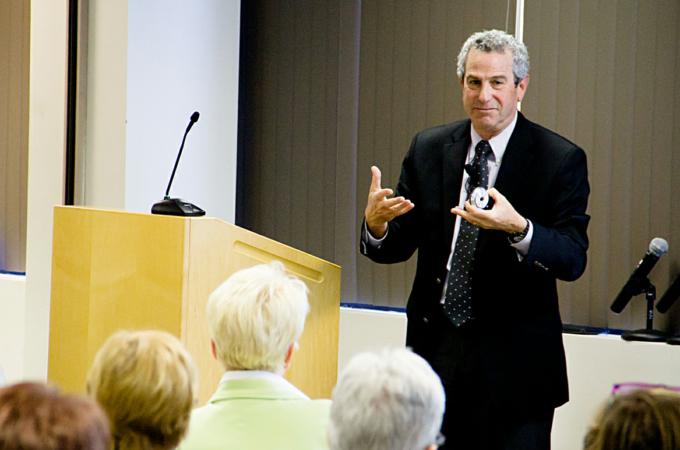Archdiocese hosts first Palliative Care Colloquium
BRAINTREE -- As part of its efforts to propose an alternative to the growing movement that promotes physician-assisted suicide as an answer to patient suffering, the Archdiocese of Boston held its first-ever annual Palliative Care Colloquium at the Pastoral Center in Braintree, April 30.
Voters narrowly rejected a ballot initiative to legalize physician-assisted suicide in Massachusetts in 2012, but the issue continues to percolate on Beacon Hill and could again come before voters in 2018.
A mix of religious and laypeople, many of whom are healthcare professionals, attended the event, which featured talks by respected individuals working in the palliative care field.
Ira Byock, founder and Chief Medical Officer of the Institute for Human Caring of Providence Health and Services in California and Professor of Medicine and Community and Family Medicine at the Geisel School of Medicine at Dartmouth, was the featured speaker.
He began by briefly discussing the history of human caring and healthcare, which he traced back thousands of years. Byock noted that starting in the mid-1900s, with the invention of modern medicines and medical practices, the healthcare in the United States has "moved a little bit away in medicine from the relational and the soulful, spiritual part of healing."
"In America, we simply conflate treatment of disease with patient care, rather than seeing treatment of disease as a component of patient care. And so we have common patterns of excessive treatment for disease while poorly attending to people's comfort and their quality of life and meeting their basic needs through the end of life," he said.
The other components of patient care are just as important, Byock posited, and do not require medical licenses to perform. Providing comfort, for example, by making sure a sick patient is given food, water, and even companionship, is crucial, and is something palliative care is focused on.
Services palliative care provide include: "goal alignment, clarifying goals, making sure people know what the physiologic outcome of treatment might be, what the functional outcome, what the known burdens and the risks are, and deciding together. We focus on family experience and quality of life, understanding that whenever one of one person gets a disease, a family gets an illness," Byock said.
"Our role is to ensure people can see their inherit dignity reflected in our eyes, can feel their inherit dignity in the way they are touched, in the way they are cared for," he continued.
He spoke out against physician-assisted suicide, but also noted that it is something that has to be acknowledged as a "reality."
Palliative care, he said, is a way to combat the desire for physician-assisted suicide, and he expressed the importance of allowing people to die naturally.
A natural death, and end of life care, provide "a chance to resolve previously strained relationships, a chance to grieve together the impending loss of life or relationships, a chance to review one's life, to tell one's stories," and an opportunity to connect with God, he said.
He ended his talk by offering ways people can easily provide those in hospice with increased comfort, such as filling an old MP3 player with music a hospice patient likes, and gifting it to that patient.
Other speakers included MC Sullivan, director of the Initiative on Palliative Care and Advanced Care Planning at the archdiocese, and Peter Cataldo, the archdiocese's Chief Healthcare Ethicist.
In her talk, Sullivan discussed a project from the Supportive Care Coalition, a national network of Catholic healthcare systems which has the sole purpose of promoting palliative care, which seeks to bolster spirituality in palliative care. Cataldo discussed Catholic moral teachings, and how they fit in with palliative care.
Byock, also an author, chatted with attendees as he signed copies of his books, including "Dying Well," "The Four Things That Matter Most," and "The Best Care Possible."
The event concluded with a Mass celebrated by Father J. Bryan Hehir, the archdiocese's Secretary for Health and Social Services.
In his homily, Father Hehir spoke on how fitting it is to hold a colloquium on palliative care during the Year of Mercy, and said palliative care "meets at the intersection of the spiritual and corporal works of mercy."
"Certainly, the corporal works of mercy include care for the ill, care for the ill at any stage of their life... But, when we turn to the spiritual works of mercy -- to council the doubtful, to instruct those about what we are to know through reason and faith to live our life well -- we find that the work of palliative care is both spiritual and corporal," he said.
In a prepared message to colloquium participants, Cardinal Seán P. O'Malley thanked both attendees and organizers, and highlighted the role palliative care plays in the fight against physician-assisted suicide.
"At a time when, throughout the United States, there is an increasing campaign to expand access to physician-assisted suicide, a challenge we are well-familiar with here in Massachusetts, it's essential that we redouble our efforts to educate people about the benefits of palliative care, and how it allows people to people to retain their dignity and the gift of life until the time of a natural death," he said.



















